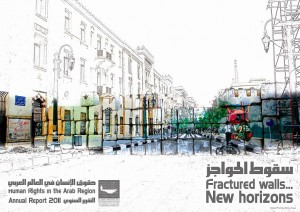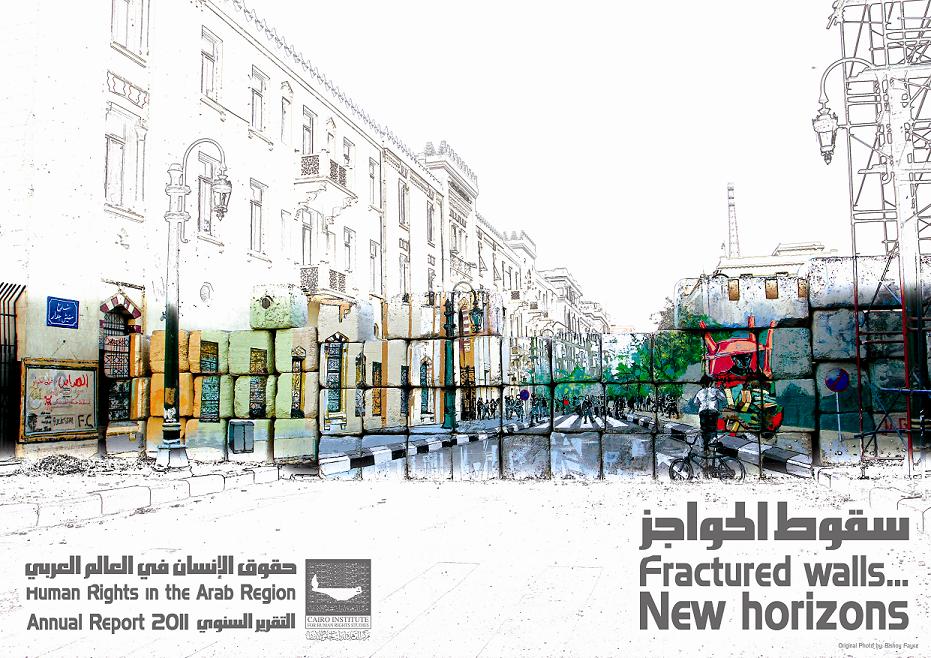Press release on the CIHRS’ annual report on human rights in the Arab world
 Nearly a year after the eruption of what the media dubbed the “Arab Spring,” it is clear that the achievements of the Arab uprisings have not equaled the sacrifices made by the peoples who rebelled in search of freedom, social justice, and human dignity. With the exception of Tunisia, the choices facing these peoples seem limited to narrow reform of old regimes or the hegemony of Islamist factions over the institutions of governance and the erosion of the foundations of the civil state.
Nearly a year after the eruption of what the media dubbed the “Arab Spring,” it is clear that the achievements of the Arab uprisings have not equaled the sacrifices made by the peoples who rebelled in search of freedom, social justice, and human dignity. With the exception of Tunisia, the choices facing these peoples seem limited to narrow reform of old regimes or the hegemony of Islamist factions over the institutions of governance and the erosion of the foundations of the civil state.
This is the conclusion drawn by the Cairo Institute for Human Rights Studies (CIHRS) in its fourth annual report, which observes and analyzes the state of human rights in 2011 in twelve countries of the Arab world: Egypt, Tunisia, Algeria, Morocco, Iraq, Syria, Lebanon, Yemen, Bahrain, Saudi Arabia, Sudan, and the occupied Palestinian territories.
The revolutionary uprisings which broke out in numerous Arab countries dealt painful blows to seemingly immovable regimes, family-based rule, and schemes for hereditary succession and succeeded in removing symbols of tyranny in Tunisia, Egypt, Libya, and Yemen. Moreover, it is proving difficult for the violent regime in Syria to find a political solution that will grant it the legitimacy to remain in power in the midst of the ongoing bloodbath that has completely alienated it from the Syrian people.
The report notes that attempts to sabotage the Arab Spring were often accompanied by large-scale, brutal repression, in many cases amounting to war crimes and crimes against humanity, especially in Libya, Syria, Egypt, Yemen, and Bahrain.
In post-Mubarak Egypt, the Supreme Council of the Armed Forces (SCAF) monopolized the administration of the transitional phase and sought to confine the goals of the revolution to the elimination of certain ruling figures and their designs for hereditary succession, adopting a political course for transition that deepened the divisions among political forces. As a result, Egyptians remained caught between the bitter choices of either the perpetuation of the old regime or the acceptance of religious fascism controlling positions of power and usurping the right of Egyptians of all classes and orientations to write their new constitution. The report attributes the massive failures to respect human rights during the transitional period in Egypt to increased repression and the development of new methods to confront opponents of the SCAF, as well as to the return of the brutal suppression of peaceful protests, increased pressure on the independent media, and an unprecedented escalation in the assault on human rights organizations and civil society.
In Bahrain, the popular uprising was contained and suppressed amid the collusion of the international community and diplomatic and military support from the countries of the Gulf Cooperation Council. Meanwhile in Yemen, the Gulf Initiative, supported by the US administration and the EU, undermined the aspirations of the popular revolution to entirely do away with the regime of Ali Abdullah Saleh and hold him accountable for his crimes. The initiative immunized the killers of the Yemeni people and Saleh’s senior aides and children from accountability and imposed his vice-president as the temporary president through elections held only as a formality, as no other candidates were permitted to compete.
The report draws attention to the continued denial of justice and ongoing impunity from accountability and punishment for human rights violations, even in those countries where authoritarian ruling figures were removed from power. Achieving justice for those killed in Egypt faced major difficulties, including extreme reluctance to refer the accused to trial, the failure to take necessary measures to prevent the manipulation or covering up of evidence, the refusal of the security apparatus to cooperate with investigating authorities, and the limited nature of measures taken to purge and institutionally reform the security and judicial establishments. As a result, the overwhelming majority of cases involving the killing of demonstrators saw the acquittal of the accused officers and their subordinates. Although the trial of the deposed president and his interior minister recently ended in their conviction and the imposition of sentences of life imprisonment, the court acknowledged the severe inadequacy of evidence against them and the failure to identify those who carried out the killings, which it cited in acquitting the senior aides of the former interior minister. Similarly, Tunisia saw no marked progress to ensure accountability for the crimes of the Ben Ali regime, despite official promises to pursue a course of transitional justice as is required by any process of democratic transition. The report notes that Tunisia has been perhaps the most fortunate country, as it appears to have been able to enter into a process of genuine transition to democracy.
This was aided by the fact that the military establishment in Tunisia had no political designs, which thus allowed an alliance of revolutionary forces made up of labor, rights, and political movements to fill the power vacuum and exclude figures of the Ben Ali regime and the members of his party from the administration of the transitional period. The moderate discourse of the Islamist Ennahda movement also fostered opportunities to build a national consensus, which is critical for successful transition. The transitional period in Tunisia saw the issuance of legislation seeking to end restrictions on press and media freedoms, liberate the work of civil society associations, support the freedom to form political parties, and put an end to crimes of torture and stiffen penalties for such crimes.
The report documented a substantial increase in the violations against human rights defenders and their organizations, particularly in Egypt, Syria, and Bahrain. In addition, the Moroccan authorities continued to target rights organizations in the Western Sahara with arbitrary arrest and unfair trials, and they also imposed restrictions on the entry of representatives of foreign advocacy organizations to the Western Sahara who came with the goal of stopping violations in that region.
The report finds that freedom of expression saw no improvement in the countries most affected by the Arab Spring, with the exception of Tunisia, and notes that a number of countries witnessed a deterioration with regards to respect for these liberties, particularly in Sudan, Lebanon, Saudi Arabia, and the Palestinian territories.
The report observes that the Arab Spring was not accompanied by any marked improvement in the status of minorities and religious freedoms in the Arab world. On the contrary, Shiites in Bahrain and Saudi Arabia bore the brunt of the repression due to their broader involvement in popular protests in those countries. The systematic discrimination and repression of the Kurdish minority in Syria also continued, while in Egypt the authorities neglected to lift the arbitrary restrictions on the construction of non-Islamic houses of worship. They also failed to protect Coptic citizens and their churches, as Egypt saw the torching or demolition of entire churches last year by religious extremists and witnessed a marked increase in sectarian tensions and clashes, which left dozens of victims.
In Iraq, violence continued to claim thousands of lives, underscoring the chronic failure of the authorities to stop the regression of the security situation and indicating that political actors of all sects remain unwilling to abide by the rules of the peaceful political process. In particular, members of the Christian and Yazidi minorities remained the targets of armed attacks designed to forcibly displace them from their homes and drive them out of regions where their populations are concentrated.
The report also describes the ongoing grave abuses committed in Sudan due to the expansion of armed conflicts and their encroachment into new areas. Continued armed assaults on the Darfur province led to the displacement of more than 350,000 residents, while the failure of negotiations between Khartoum and the government of South Sudan over disputed border areas led to armed attacks and clashes in the Abyei region and turned the South Kordofan and the South Blue Nile provinces into new battle zones. The report documents the Khartoum government’s responsibility for a number of war crimes and crimes against humanity, particularly in South Kordofan, including extrajudicial killing, the random shelling of residential areas and refugee camps, the torching, destruction, and looting of churches, and cases of rape.
The winds of the Arab Spring affected the occupied Palestinian territories as well, resulting in pressure to end the division between the two parties to the Palestinian Authority. Thus far, however, the reconciliation agreement has produced no fundamental change with regards to respect for human rights and public liberties that would end the reciprocal violations practiced by both sides against those deemed loyal to the other. Nor did the agreement mark the emergence of the political will needed to end the dual power structure and to integrate and reform the security and judicial establishments.
Similarly, the report documents the persistence of grave violations of the rights of Palestinians by the Israeli occupation authorities, including the military shelling of the Gaza Strip, the assassination and murder of those Israeli considers to be involved in military actions against it, ongoing apartheid policies, and the siege and collective punishment of the residents of Gaza for the fifth successive year.
The year 2011 saw the unleashing of popular struggles in numerous Arab countries for the sake of dignity, freedom, equality, social justice, and democratic governance – a remarkable development in a region where this struggle had for so long fallen to individual activists, limited circles of rights organizations, and isolated political parties or groups. Nevertheless, a long road lies ahead before the struggle for democracy achieves its noble goals.
Share this Post

